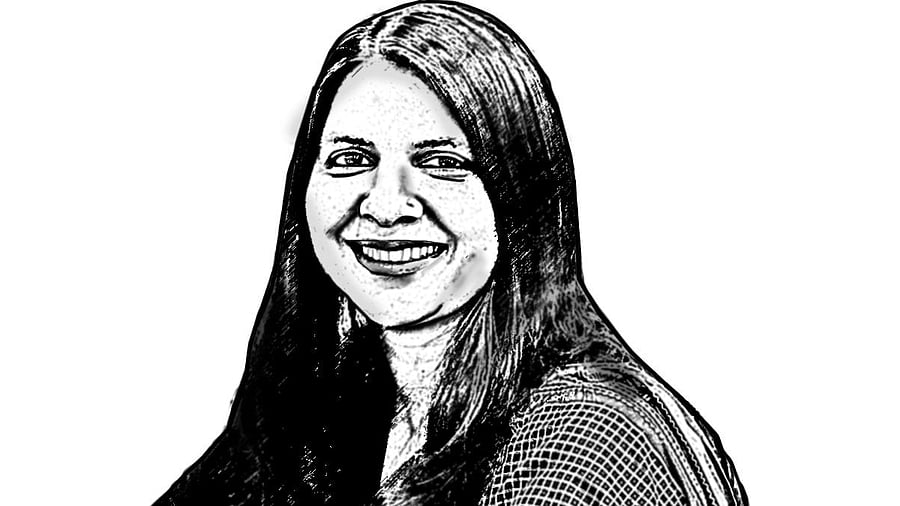
Yamini Aiyar is thinking, not tanking, at Brown University, ever a policy wonk intrigued by the everyday life of Bharat Sarkar @AiyarYamini
After inexplicable delays, a new set of social science textbooks was released last week, ostensibly aligned to reflect the new pedagogical approach of the NEP 2020 and the associated 2023 new curriculum framework. No one is fooled.
These textbooks have little to do with updating the pedagogy or making our remarkably unimaginatively written, and taught history textbooks exciting for young students. The communal and prejudiced undertones of this rewrite are visible in the Standard 8 history textbooks.
This is about instrumentally using our school system to service the cause of Hindutva and go to war with India’s Mughal past, and the so-called “dark period” of our history.
In the last few days, national media have been consumed by a high-pitched battle as details of these textbooks are being debated threadbare. These debates are essential, and I am grateful that the blatant communalisation of our history textbooks is, at least, being debated. However, when I step back from the politics to the prosaic everyday world I occupy in my personal and professional life, I am also struck by how divorced these heated history wars are from the realities of our school system and the social compact around which it coheres.
In my personal life, I am the parent of an 8th grader, and these textbooks are doomed to be part of my household’s everyday struggles. In my professional life as a researcher, I have spent years chronicling the travails of India’s public school system and its obsession with high-stakes examinations that can be conquered only by rote learning. When considered from the two vantage points, these debates on history have a surreal quality to them. They feel like our theatre of the absurd.
As a parent, the unfolding debate would be comical if its consequences were not so tragic. We are three months into the academic year, and the textbooks are still not distributed. Where is the time for teachers to prepare, if they don’t know what the core textbooks look like? Arguably, this won’t matter in any significant way. The textbooks have been dull and badly written; students are bored, and history from my days in school has been taught as a subject where you must cram dates and places and relay them with little critical engagement in the exam. Even my historian sister admits that she would never have thought she would become a historian while struggling through CBSE History! The same fate awaits my children.
For once, I am grateful. They are unlikely to be influenced by the distorted and prejudiced textbooks, for they are unlikely to remember what they study in school, even though the tiger-mom side of me will force them to memorise whatever they need to, to pass the exam. I will do so in the comfort that the real history they will learn from books outside of these textbooks. In a different world, the rewrite and debates ought to have been about infusing critical thinking, about developing in students the capacity to engage with the complexity of history to arrive at a nuanced understanding of our past. Instead, the battlefield has shifted to these distorted realities. And we can take solace in the fact that a badly taught subject may well save us from bringing up a whole generation schooled in prejudice.
As an aside, for a political regime that willingly flirts with authoritarianism, the incompetence is astounding. Deadlines came and went, books are yet to be printed, curriculum is still to be completely revised. On the upside, thanks to this inefficient rewrite, the 8th grader has been introduced to the concept of secularism, and the textbook continues to inform us that this is a core constitutional value. Phew, incompetence may well save us!
Ground realities of what it means to be a teacher in a dysfunctional system and distorted incentives that teachers respond to make these debates feel like they are in
a parallel universe. “Forget understanding, just apply rote learning and pass the examination. I will be very happy” – is how a public school teacher in Delhi described how she “teaches” her students. The emphasis is on rote because exams are the only metric she is held accountable to. Mastery of examinations, and not of learning, is the foundational logic of our education system. This is what I call the classroom consensus. The broad social compact around education emphasises its instrumental rather than public value. And in this process, there has been no real effort to build collective societal ownership over broader goals of critical thinking and social solidarity that education ought to deliver. Debating history and facts is important, but until we build a broader societal consensus over the public value of education, our curricula and textbooks will remain vulnerable to political capture.